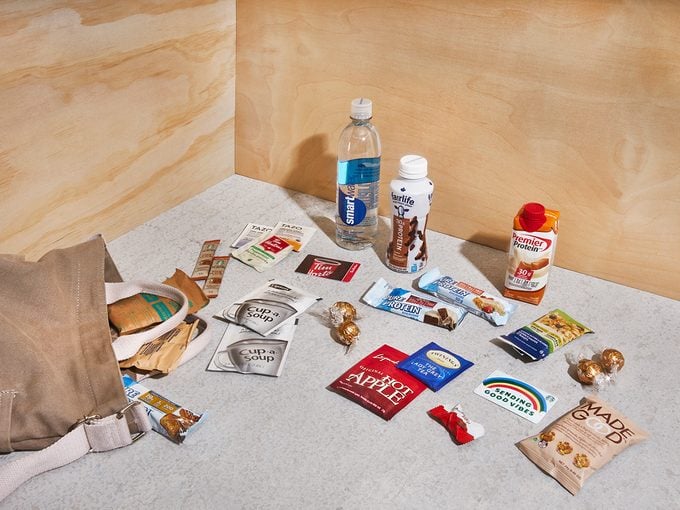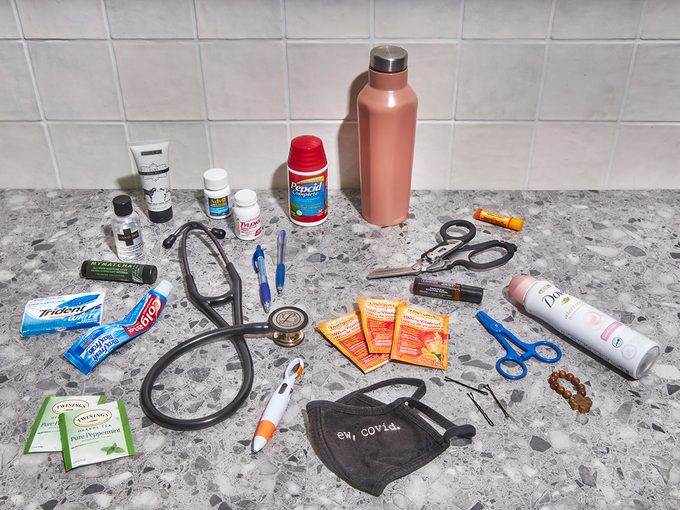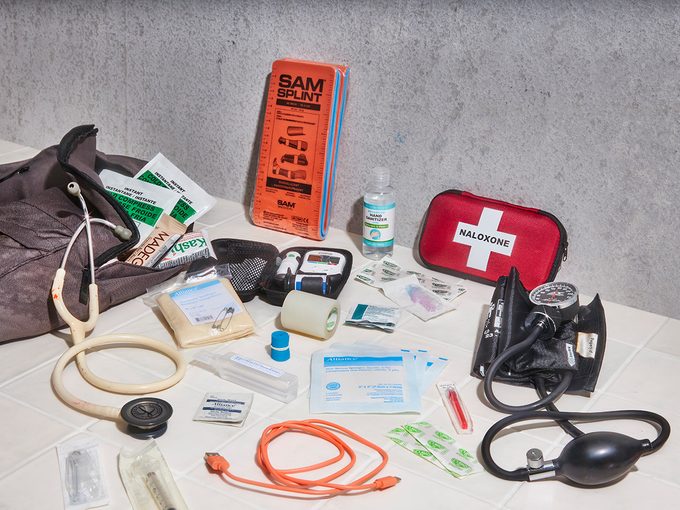Nurses Share the Extra Items They Keep On-Hand to Do Their Jobs
You work hard. Nurses work harder. Here’s what three of them pack in their bags to get through a high-stakes shift.

Sue
Float nurse who fills staffing gaps in medical and surgical units
“I noticed people weren’t eating their lunches or dinners, so I started bringing more protein-focused snacks, like bars or shakes, to help them easily refuel.”
Sue loves being kept on her toes. She usually works night shifts, when there are fewer nurses, doctors or allied health care staff available. And though she regularly works with different teams, she finds ways to build connections and community. “Time just gets lost when we’re scrambling on nights,” she says, so she keeps snacks on hand to share with colleagues when they need an energy boost, and Tim Hortons or Starbucks gift cards to buy co-workers coffee in the morning. “After a long shift, when you’re tired and often feeling underappreciated, having a little treat to look forward to can be a pick-me-up.”
“I drink a lot of caffeine, so I always have instant coffee sleeves and bags of tea within reach, and to hand out. I also like to pack around little apple cider mixes or pumpkin spice mixes just to liven things up! And to have an option for people who can’t have caffeine.”
During a recent shift, Sue was on a unit with one charge nurse and two graduate nurses with less than three months of experience. She says everyone, including the inexperienced nurses, is expected to take on eight patients: “The strain and burden can get overwhelming … we are called heroes all the time. But we’re also human. We’re not martyrs and we need a break as well.” Sue says it’s easy for nurses to get tangled up in completing tasks without looking after their own health and well-being, so she feels compelled to help her colleagues where she can, usually by providing food and drink.
(Related: 10 Medicine Cabinet Essentials Nurses Always Keep on Hand)

Laura
Critical care nurse and ER nurse
“I carry my trauma shears everywhere. They’re handy to have if you need to be able to get something off quickly. One of my paramedic colleagues uses them on the road—they can cut through a seatbelt; they can spider a windshield. I once used them to cut flame retardant clothing off a firefighter who came into the trauma unit.”
Laura is someone people know to go to for self-care in the middle of a shift. “We treat ourselves so that we can continue to do our job and continue to provide care. I think that we nurses have been doing that for a long time. But the feeling of that happening now is more at the forefront than I’ve ever felt before.” She likes working in a dynamic, fast-paced work environment: “That’s what I feel passionate about, and that’s what drives me … but it’s also hard when you don’t feel like you’re making a dent or an impact because you’re just stretched so thin.”
“I like having nice-smelling things on hand to make my patients feel comfortable. It feels good when you can offer something as simple as that, but it has such an impact for people.”
Laura says that because nursing is an essential profession, nurses don’t have the bargaining power that other professions may have. Part of the problem, she says, is also “because we are a female-dominated profession” and taken for granted. She says Ontario’s Bill 124, which limits annual salary increases to one percent for most public-sector employees, feels like a slap in the face. “We’ve been the backbone of trying to get the entire province through this pandemic, looking after people at our own peril sometimes.”
(Related: What a Nurse Keeps in Her First-Aid Kit at Home)

Roxie
Family health nurse
“Because of the ongoing drug crisis and the war on people who use drugs, there are people dying every day of an overdose. Having a Naloxone kit [which includes a fast-acting drug used to temporarily reverse the effects of opioid overdoses] is really, really important.”
Roxie works in a clinic Monday to Friday, and spends her free time doing volunteer outreach work for people who face structural barriers to care. She attends events like encampment evictions and rallies to support Black and Indigenous lives so she can offer on-the-ground treatment.
“Snacks and water keep me going because I’m on my feet for hours at a time. My colleagues and I, even in clinic, we forget to drink water and so we’re constantly reminding each other to do that.”
Roxie is part of the Street Nurses Network, a group working with people experiencing homelessness. “As a nurse you’re used to working in a clean clinic or hospital space, but when you’re outside meeting people exactly where they are, that’s different. You’re just using the space that you have. One time I saw a client at a grocery store bathroom, and that’s where I gave an injection. I’ve given an injection on the steps of a church. Managing your environment is definitely something that’s different here than other forms of nursing.”
Sahil Gupta is an emergency room doctor based in Toronto. This story originally appeared on healthydebate.ca.
Next: Caring For My Dying Mom Showed Me That Caregivers Need More Support, Too




